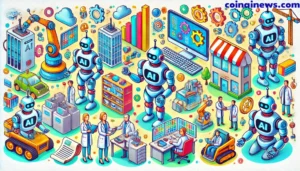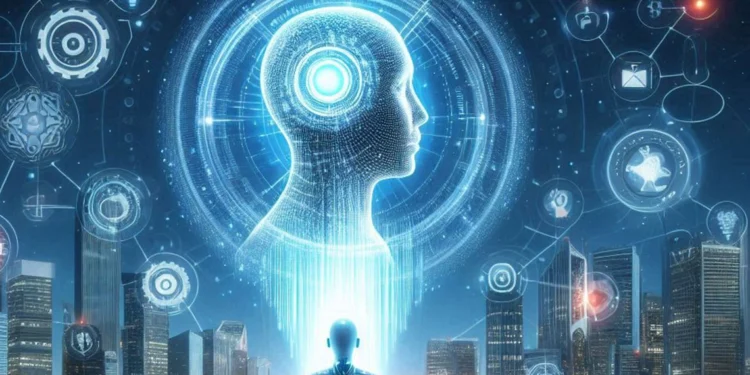The rise of Artificial Intelligence (AI) is revolutionizing industries across the globe, driving innovations, reshaping business models, and streamlining operations. AI, once a concept confined to science fiction, has become an integral part of modern industry. From healthcare to finance, manufacturing to marketing, AI’s impact is profound. In this article, we will explore how AI is transforming various sectors, the benefits it offers, the challenges it presents, and the future of this groundbreaking technology.
How AI is Revolutionizing Different Industries
Healthcare
AI in healthcare is improving diagnostics, personalized treatment plans, and operational efficiency. Machine learning algorithms analyze medical data to identify patterns, making early diagnosis more accurate. AI-driven robots assist in surgeries, providing precision and reducing recovery times.
AI-Driven Diagnostics
AI algorithms can detect diseases such as cancer at an early stage by analyzing medical imaging data faster and more accurately than humans. This not only improves the chances of survival but also reduces the workload of healthcare professionals.
Personalized Healthcare
AI systems use patient data to recommend personalized treatments and medication plans, enhancing the overall healthcare experience and outcomes.
Finance
AI is transforming the finance industry by improving customer service, risk management, and fraud detection. Algorithms analyze vast amounts of financial data, enabling banks and financial institutions to make informed decisions quickly.
Fraud Detection and Prevention
AI’s ability to analyze transaction patterns in real time helps financial institutions identify fraudulent activities before they escalate. This has become crucial in preventing financial fraud.

Automated Trading Systems
AI-powered trading systems can analyze market data and execute trades at lightning speeds. These systems are designed to adapt to market changes, providing a competitive edge in the trading environment.
Retail and E-commerce
AI is enhancing customer experiences in retail through personalized recommendations, smart inventory management, and chatbots. Retailers use AI to track consumer behavior and predict trends, ensuring the right products are available at the right time.
Personalized Shopping Experiences
AI algorithms analyze browsing and purchase histories to offer personalized product recommendations, increasing conversion rates and customer satisfaction.
Supply Chain Optimization
AI is revolutionizing supply chain management by predicting demand, optimizing inventory levels, and automating logistics. This helps businesses reduce waste and improve efficiency.
Manufacturing
In manufacturing, AI-driven robots and automation are streamlining production processes, improving product quality, and reducing operational costs. AI-powered predictive maintenance systems anticipate equipment failures, minimizing downtime.
Predictive Maintenance
AI systems monitor equipment health and predict failures before they occur, allowing manufacturers to perform timely repairs and reduce downtime.
Automation of Production Lines
Robots, guided by AI, perform repetitive tasks such as assembly and packaging, improving production speed and consistency.
Transportation and Logistics
AI is enhancing transportation through autonomous vehicles, route optimization, and fleet management. By analyzing traffic patterns, AI algorithms can determine the most efficient routes for drivers.
Autonomous Vehicles
Self-driving cars and trucks are a prime example of AI’s impact on the transportation sector. These vehicles use AI to make decisions in real-time, reducing the risk of human error and improving road safety.
Smart Logistics and Delivery Systems
AI improves logistics by optimizing delivery routes, ensuring faster delivery times, and reducing fuel consumption.
Education
AI is transforming education by offering personalized learning experiences, automating administrative tasks, and providing intelligent tutoring systems that cater to individual student needs.
Personalized Learning
AI platforms track students’ progress and adapt lessons to their learning styles, enhancing retention and engagement.
Automating Administrative Tasks
AI systems handle tasks such as grading and scheduling, allowing educators to focus more on teaching.
Challenges and Concerns of AI Adoption
While AI presents immense opportunities, there are also challenges to its widespread adoption. These include issues related to privacy, job displacement, and ethical concerns.
Data Privacy and Security
The collection of vast amounts of personal data by AI systems raises concerns about data privacy and security. Ensuring that data is protected and used responsibly is crucial for the future of AI.
Job Displacement
As AI continues to automate tasks traditionally performed by humans, there is growing concern about job displacement. However, AI also creates new job opportunities in tech-driven sectors.
Ethical Dilemmas
AI algorithms can sometimes exhibit biases, leading to unfair decisions. It’s essential to create ethical guidelines and frameworks to ensure AI operates in a manner that benefits all.
The Future of AI: What’s Next?
Looking ahead, AI will continue to evolve and make an even greater impact across industries. The future promises more advanced AI applications, such as AI-driven healthcare solutions, smart cities, and personalized AI companions.
AI in Smart Cities
In the future, AI will play a crucial role in building smart cities, where data from sensors and devices will be analyzed to optimize traffic, energy use, and city planning.
Advanced AI in Healthcare
AI could lead to breakthroughs in healthcare, from better treatments for chronic diseases to advancements in genomics and drug discovery.
Conclusion
Artificial Intelligence is not just a passing trend; it is here to stay and will continue to transform industries for years to come. While challenges exist, the benefits AI offers—improved efficiency, enhanced decision-making, and innovative solutions—are undeniable. As AI evolves, it promises to unlock even more potential, revolutionizing industries in ways we can only begin to imagine.
FAQs
1. How is AI being used in healthcare?
AI is used in healthcare for diagnostic support, personalized treatment plans, and predictive analytics. It helps improve accuracy and efficiency in diagnosing and treating diseases.
2. Will AI replace jobs?
AI may replace certain repetitive tasks, but it will also create new jobs in tech-related fields. The key is to adapt and reskill the workforce.
3. How does AI improve customer service in retail?
AI enhances customer service by providing personalized product recommendations, automating chat interactions, and predicting customer needs.
4. What are the ethical concerns related to AI?
Ethical concerns include data privacy, bias in AI algorithms, and the potential for AI to make decisions that negatively affect people.
5. What does the future hold for AI?
The future of AI includes advancements in autonomous systems, smart cities, and healthcare innovations. It promises to be even more integrated into daily life, making processes more efficient and personalized.









